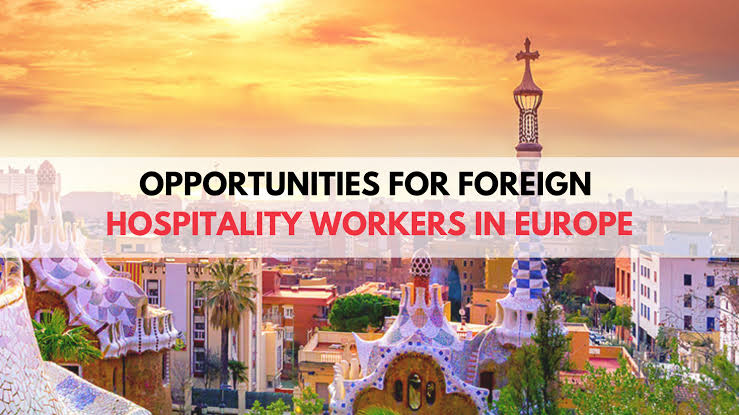Europe is one of the most visited regions in the world. According to data from the UN World Tourism Organization, Europe welcomed over 600 million international tourists in recent years. That’s more than half of the global tourist population! Countries like France, Spain, and Italy alone receive millions of visitors every year, especially during the summer holidays. This massive number of tourists creates a huge demand for workers in hotels, restaurants, resorts, tour companies, and many more sectors linked to hospitality.
But here’s something even more interesting: it’s not just about fancy hotels or five-star restaurants. The industry is wide and has jobs for different skill levels — from entry-level jobs like front desk receptionists, waiters, and housekeeping staff to managerial and executive roles. Are you someone just starting out or a trained professional? I can guarantee you that there’s space for you in Europe’s hospitality scene. Plus, with the recent recovery from the COVID-19 pandemic, the tourism industry is bouncing back even stronger, which means more jobs are opening up.
Let’s break it all down and look at what kinds of jobs are available in this field, what the pay is like, and where the best opportunities are across Europe.
An Overview of Hospitality and Tourism Jobs in Europe
The hospitality and tourism industry in Europe is a massive one. It covers a range of services that revolve around providing experiences, comfort, and leisure to both locals and travelers. Think of jobs in hotels, airlines, cruise ships, tour agencies, museums, restaurants, bars, and even amusement parks.
One of the great things about this industry is how international it is. Many businesses hire staff from different countries to meet the diverse needs of their guests. So, even if you’re not from the EU, there are still job opportunities, especially if you can speak multiple languages or bring unique cultural knowledge to the table.
Also, hospitality and tourism aren’t seasonal anymore. Yes, summer and winter holidays are peak periods, but many European countries like Germany, Austria, and the UK see visitors year-round. Most come there for business, conferences, festivals, or simple city breaks. So the job demand stays pretty steady.
Moreover, hospitality is not just about service—it’s about experience. That’s why companies are always looking for friendly, reliable, and people-oriented workers. If you’re someone who enjoys meeting new people, solving problems on the go, and working in lively environments, you’ll probably thrive in this industry.
Tourism and Hospitality Job Opportunities Available in Europe
So, what kind of jobs can you actually get in Europe’s hospitality and tourism world? A whole lot!
The good thing is that many of these jobs don’t require a university degree. Some jobs may need specific training or certifications, like chefs or tour guides, but others are open to anyone with the right attitude and willingness to learn. And with short training courses or hospitality schools available in many countries, you can upskill quickly if you want to move up the ladder.
Some countries are more flexible than others when it comes to recruiting non-EU citizens, but places like Germany, Portugal, and the Netherlands are becoming more open to international workers, especially in sectors with labor shortages.
So let’s look at some of the top jobs available in this sector.
Hotel and Resort Staff
Have you ever stayed at a hotel and noticed how everything seems to run smoothly? Then that’s the hotel staff doing their thing. Hotels and resorts are everywhere in Europe.
Jobs here include front desk receptionists, concierges, housekeepers, porters, and room service. Receptionists are usually the first people guests meet, so if you’re friendly and speak English (or other languages), you’re already a strong fit. Housekeeping might not be glamorous, but it’s steady work and often comes with accommodation perks.
Big hotel chains like Marriott, Hilton, and Accor are always looking for people. Even smaller, family-run hotels hire seasonal or full-time staff. These jobs are great if want where to start from.
Restaurant and Food Service Jobs
Europeans love food. Jobs in this space include waiters, bartenders, chefs, dishwashers, and kitchen helpers. Waiters and bartenders usually earn a base salary, and depending on where you’re working, you might get tips too. That’s especially true in tourist-heavy areas.
If you’ve got cooking skills, being a chef or line cook could be a solid path. You don’t need to be very perfect as many places train on the job, especially for beginners. And if you’re good? You can work your way up the kitchen quickly.
Travel Agencies and Tour Operators
This one’s perfect for people who love planning trips or showing others around. Travel agencies and tour companies are big in places like Rome, Paris, London, and Amsterdam.
They hire tour guides, travel consultants, sales agents, and trip planners. As a tour guide, you’ll be walking tourists through cities, explaining cool history or helping them find the best photo spots. It’s fun, social, and rarely boring.
Travel consultants usually work behind the scenes — booking hotels, flights, and organizing itineraries.
Cruise Ship and Ferry Jobs
Now, if you’ve got a bit of pleasure in you, cruise ships are for you. It’s like floating cities and they need a lot of people to keep them running.
Jobs include cabin stewards, restaurant servers, entertainment staff, cleaners, and even fitness instructors. You could also work in shops, bars, or guest services. Ferries operating between places like Greece, Italy, or Scandinavia also need staff, though it’s usually more basic.
The pay varies, but most cruise jobs come with free food, accommodation, and travel. The catch? You’ll be away from home for weeks or months. But hey, you get to see the world and meet people from everywhere.
It’s not for everyone, but if you’re okay with working on the move, this can be a fun and rewarding experience.
Event and Conference Staff
Europe is full of events like music shows, business conferences, fashion shows — you name it. And all of these events need people behind the scenes to make things happen.
Here, you’ll find jobs like event coordinators, ticketing staff, logistics assistants, ushers, and setup crew. It’s usually short-term or contract work, but it can lead to full-time gigs if you build a reputation.
These roles are great for people who are organized, good with crowds, and can think fast when things go wrong. It’s also an amazing way to network.
Airline and Transport Jobs
This one’s a bit more formal, but still part of the tourism scene. Airlines and transport companies—like airports, bus services, and train stations hire a lot of people to help travelers move smoothly.
Common roles include flight attendants, check-in agents, customer service reps, luggage handlers, and cleaners. Airports in major cities like Frankfurt, Madrid, and Heathrow are constantly recruiting. Follow our website to get updates on when the recruitment is out for each of them.
How Much Do Hospitality and Tourism Jobs Pay in Europe?
Now, let’s talk about money — because let’s be honest, it matters!
Salaries in hospitality and tourism vary depending on the country, the role, your experience, and whether you’re working for a small business or a large chain. Here’s a rough idea of what you can expect:
Entry-level jobs like cleaners, housekeepers, and kitchen assistants usually pay between €1,000 to €1,800 per month in most European countries. In places like Spain or Greece, it may be a bit lower, but in Germany or the Netherlands, it tends to be higher.
Waiters and bartenders can earn around €1,200 to €2,000 monthly, and in places with tipping cultures (like Italy or France), tips can make a big difference.
Front desk agents or hotel receptionists earn between €1,500 and €2,500 per month, depending on the hotel and city.
Chefs and kitchen staff with experience can earn from €2,000 to €3,500 or more. Executive chefs in top restaurants can earn even higher, especially in cities like Paris or London.
Tour guides usually get paid per tour or per hour, with daily rates ranging from €50 to €150, and some freelance guides can earn more if they’re good at marketing themselves.
Managers or supervisors in hospitality, like hotel managers or restaurant supervisors, often earn €3,000 to €5,000 monthly, depending on the location and responsibilities.
The good thing! Some employers also provide extra benefits like accommodation, meals, transport, or travel allowance. Also there are tourism jobs in Europe for English speakers.
Of course, your pay will go up the more experience you gain, and many companies offer seasonal bonuses or allow overtime, which can boost your income.
Wrapping Up
Hospitality and tourism jobs in Europe offer not just the money, but also a lifestyle. It’s one of the few fields where your office could be a beach resort in Greece, a nice café in Paris, or a luxury cruise across the Mediterranean. It’s ideal for people who love being around others, enjoy fast-paced environments, and want the chance to grow in their careers without necessarily needing a traditional college degree.
Even if you’re already in Europe or planning to move there, this sector is worth exploring. There are opportunities for everyone either young graduates, career switchers, international workers, and even students looking for part-time gigs. Just remember, having good communication skills, a service mindset, and maybe a second language can take you far.
So, if you’re on the lookout for a job that’s exciting, social, and full of opportunity, hospitality and tourism in Europe might just be your perfect match.


